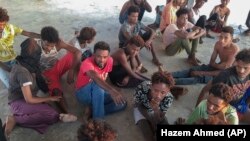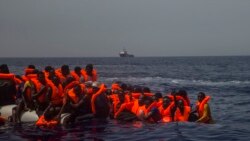Related news investigations published by The New Yorker magazine and NBC News have cast the European Union in a critical light for helping Libya catch and detain Europe-bound immigrants fleeing strife in the Mideast, central Asia and sub-Saharan Africa.
On November 29, NBC News published a report on EU assistance to the Libyan Coast Guard and alleged violations of refugee rights. A similar investigation by Der Spiegel last spring also focused on how Frontex, the EU’s border patrol force, helped the Libyans locate migrants attempting to cross via the Mediterranean.
The New Yorker investigation accused the EU of creating a “shadow” immigration system that keeps migrants detained in secretive centers where they are abused by profit-making militias.
Citing human rights groups, The New Yorker report said detainees had been victims of rape, electric shock and other forms of torture, forced to pay ransoms and sold into forced labor.
More than 1 million refugees crossed to Europe in 2015 and 2016, mostly from Syria, Iraq, Afghanistan and African countries. Despite the harrowing risks of crossing by sea – thousands have drowned in the attempt – the flow continues toward Spain, Italy and Greece. But the EU cut off maritime rescues nearly three years ago, and now stands accused of using Libya as a surrogate to deter and detain migrants.
Here is how the NBC report described the system:
“The E.U., led by Italy, has trained and equipped the Libyan Coast Guard to serve as a proxy maritime force, whose central purpose is to stop migrants from reaching European shores. Flying drones and airplanes over the Mediterranean, Frontex locates migrant rafts, then alerts the Italians, who, in turn, inform the Libyan authorities. Once captured by the Libyan Coast Guard, tens of thousands of these migrants are then delivered into a dozen or so detention centers run by militias.
“This collaboration has been the principal factor in a precipitous drop in the number of migrants reaching Europe: Around 20,000 migrants arrived in the first seven months of this year, down from 70,000 during the same period in 2016. Without the support of aerial reconnaissance from Frontex, the Libyan Coast Guard would in effect be searching with its eyes closed.”
In response to questions about EU responsibility for the abuses, Josep Borrell, EU’s high representative for foreign affairs, told NBC News the EU only provided humanitarian aid:
“The E.U. Emergency Trust Fund for Africa does not fund the country’s detention centers. However, through its partners, the Commission does provide lifesaving support to detained migrants.”
But based on evidence in the investigative news reports, that is misleading.
The EU has consistently denied its responsibility for the inhumane treatment of refugees in Libya and other front-line countries on migration routes despite criticism from human rights groups.
Libya has become a preferred migration route for refugees that come from Africa. The EU’s Emergency Trust Fund program for Africa is a partnership with 26 countries to address “root causes of irregular migration and displaced persons” on the continent. According to the fund's web site, it has spent more than $500 million on humanitarian programs in Libya, including for COVID-19 support.
But while the fund describes its mission as one of "managing flows, saving lives," the reality is far more complex, according to The New Yorker report:
“[M]uch of [the trust fund's] work involves pressuring African nations to adopt tougher immigration restrictions and funding the agencies that enforce them. In 2018, officials in Niger allegedly sent ‘shopping lists’ requesting gifts of cars, planes, and helicopters in exchange for their help in pushing anti-immigrant policies. The program has also supported repressive state agencies, by financing the creation of an intelligence center for Sudan’s secret police, and by allowing the E.U. to give the personal data of Ethiopian nationals to their country’s intelligence service.
"The money is doled out at the discretion of the E.U.’s executive branch, the European Commission, and not subject to scrutiny by its Parliament.”
The NBC report said the EU, led by Italy, trained and equipped Libyan security guards accused of abusing refugees. The EU has also lobbied the United Nation’s International Maritime Organization (IMO) to expand Libya’s search and rescue zone in the Mediterranean, NBC said.
As in the earlier Der Spiegel report, the NBC story cited Frontex for transmitting aerial reconnaissance video to Libya’s coast guard:
“Though the Libyan Coast Guard routinely opens fire on migrant rafts, has been tied by the U.N. to human trafficking and murder and is now run by militias, it continues to draw strong E.U. support. In 2020, the E.U. shipped four new speedboats to the Libyan Coast Guard so that it could more effectively capture migrants and send them to the same detention centers that the U.N. has described as being involved in state-sponsored crimes against humanity.”
Both The New Yorker and NBC reports were published in collaboration with The Outlaw Ocean Project, a news nonprofit founded by Ian Urbina, an award-winning investigative journalist. Over 11 months, the project team scoured public documents, interviewed EU politicians and sifted through the social media of Libyan officials to follow the EU money:
“The investigation found that the E.U. pays for every aspect of the migrant interception infrastructure in some way – from aerial surveillance to Libya’s boats, from the SUVs that intercept migrants in the desert to the buses that bring them from port to the gates of the detention centers. It even pays for the offices of the Libyan Coast Guard.”
Human rights groups have long detailed how Europe-bound asylum seekers who are brought back to Libya are kept in holding centers run by lawless armed militias. Human Rights Watch stated in its January 2019 report, “No Escape from Hell,” that the EU’s migration cooperation with Libya is creating a “cycle of extreme abuse.”
Briefing the U.N Security Council on November 24, the U.N. Secretary-General’s Special Envoy for Libya, Jan Kubis, expressed concern over arbitrary and unlawful detentions and enforced disappearances.
“Many detainees including migrants, refugees, and asylum seekers are subjected to torture, sexual violence, and other grave human rights violations involving State officials, and thousands of detainees are held in secret facilities run by armed groups and human trafficking networks,” Kubis said.
In May, the Office of the U.N. Commissioner for Human Rights (OHCHR) weighed in. Its report, titled “Lethal Disregard: Search and rescue and the protection of migrants in the central Mediterranean Sea,” said the plight of refugees in Libya “is not a tragic anomaly, but rather a consequence of concrete policy decisions and practices by the Libyan authorities, European Union (EU) Member States and institutions, and other actors that have combined to create an environment where the dignity and human rights of migrants are at risk.”
The OHCHR report called on the EU to “refrain” from shifting responsibility for search-and-rescue operations to Libya, concluding:
“The overarching messages of this body of research and reporting make clear that: Libya is not a safe place for the return or disembarkation of migrants rescued at sea; current SAR policies and practices in the central Mediterranean enable a range of violations and abuses against migrants rather than ending them; and all States in the region, as well as the EU Border and Coast Guard Agency, the EU Naval Force for the Mediterranean, the European Commission and other stakeholders, must urgently reform their SAR (search and rescue) policies, practices, funding and cooperation in order to promote more principled and effective migration governance that prioritizes the protection of migrants at sea and is consistent with obligations under international law.”
Libya descended into chaos after NATO-backed rebels ousted its long-time ruler, Muammar Gaddafi, in 2011. The country is now divided between the U.N.-backed Government of National Accord (GNA), based in the capital Tripoli, and a rival government backed by the Libyan National Army (LNA) under the command of General Khalifa Haftar.
Human rights watchdogs have criticized other EU-funded immigration efforts, including refugee holding centers in Greece that Doctors Without Borders called “dehumanizing.”
“After fleeing their homes and surviving harrowing journeys to Europe, the indefinite containment, limbo, and systematic violence in Greece further traumatizes people seeking protection,” the group said.






